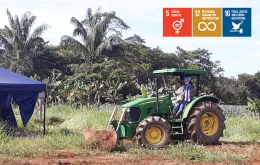As part of the peace process in Colombia, women volunteers guide former FARC-EP members in their productive initiatives and execution of their projects from the agricultural sector. The incorporation of volunteering in the work of the Mission has allowed many people to be protagonists of such a historic peace process. Women have been key in the implementation of the agreement, even in areas traditionally dominated by men, such as agriculture.
On November 24, 2016, after a confrontation lasting more than half a century, the National Government and the Revolutionary Armed Forces of Colombia-Ejército del Pueblo (FARC-EP) agreed to definitively end the internal armed conflict, with the signature of the Final Agreement for Ending the Conflict and Building a Stable and Lasting Peace.
The UN Security Council, with its Resolution S/RES/2261(2016), decided to establish a political mission to participate in the Peace Process. Resolution 2366 (2017) established the United Nations Verification Mission in Colombia to verify the implementation by the Government of Colombia and FARC-EP of sections 3.2 and 3.4 of the Final Agreement regarding the political, economic and social reintegration of FARC-EP and the implementation of personal and collective security guarantees and of comprehensive programmes on security and protection measures for communities and organizations in the territories.
The incorporation of volunteering in the work of the Mission has allowed many people to be protagonists of such a historic peace process. Women have been key in the implementation of the agreement, even in areas traditionally dominated by men, such as agriculture.
An example is Maira Alejandra Echeverry Prada, national UN Volunteer Reincorporation and Rural Development Specialist with the United Nations Development Programme (UNDP) in Colombia.
As an agronomist and specialist in Strategies for Rural and Territorial Development, Maira is part of the socio-economic reintegration process of former FARC-EP Members from the agricultural sector, leading the training processes and formulation of productive projects through the MPTF Multidonant Fund.
Her assignment is part of a project on integral reincorporation in productive environments, which seeks to promote collective and community processes that facilitate and strengthen capacities and sustainable productive alternatives, and that contribute to generate conditions for a sustainable and lasting peace from the territorial environmental, and human rights approaches. She has contributed to the formulation of 30 plans and in the implementation of eight collective productive projects.
The success of these productive projects and their sustainability represent the greatest challenge of the project, as well as the installation of capacities in the communities in this reincorporation process. --Maira Alejandra Echeverry Prada, UN Volunteer with UNDP, Colombia
Maira's community work includes the formulation and implementation of public policy with a territorial approach. She supports sustainable rural productive projects, with emphasis on the empowerment of women and rural youth from the productive sphere. Through her work, she also contributes to the growth of agriculture as an economic sector in Colombia, recognizing the role of farmers in the development of productive systems with higher revenues and less environmental degradation.
The Sustainable Development Goals (SDGs) are all included in the initiatives for the reincorporation in productive environments; however, the SDGs with highest impact are 5 (Gender Equality), 12 (Responsible consumption and production), and (16) Peace, Justice and Strong Institutions.
Territorial Spaces for Training and Reincorporation are places where life stories and multiple dreams converge; where part of the memory is contained and where the purposes of a new life in peace are gestated. I have seen landscapes and taken steps that I would never have thought possible, in remote places where the conflict was lived, and where more than 10,000 people bear hope for a new future. --Maira Alejandra Echeverry Prada, UN Volunteer at UNDP Colombia.
This UNV assignment allows Maira access to technical spaces such as the National Council of Reincorporation, where the work of the territories is articulated, making visible advances and overcoming challenges that contribute to the fulfillment of the agreement. She also carries out work with communities and institutions at the local level, where technical, commercial and organizational-administrative capacities are strengthened.
Maira affirms that her assignment allows her "more sensitivity and the ability to reinvent myself each day to serve other people" within the framework of this historic peace process, where, as she demonstrates, women play a fundamental role.

